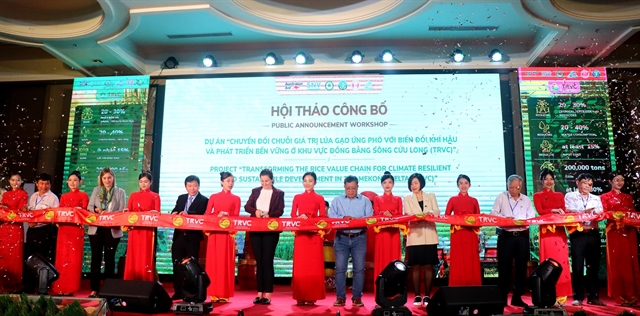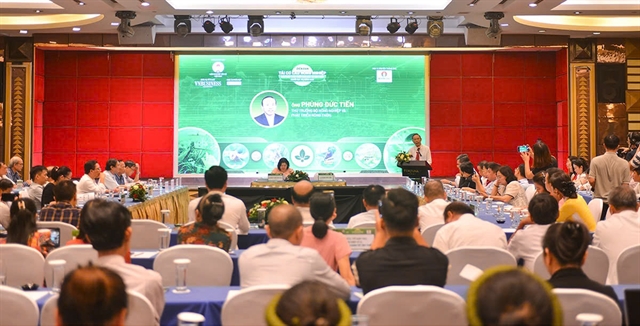 Society
Society

 |
| The forum on Restructuring Agriculture: Solutions for Effective and Sustainable Development of Agricultural Value Chains organised by the Business Magazine on August 28 in Hà Nội. VNS Photo Tố Như |
HÀ NỘI – The effective and sustainable development of the agricultural value chains is a vital issue in agricultural restructuring.
It is the best way to promote the consumption of agricultural products and increase their value said Cao Xuân Thu Vân, chairwoman of the Việt Nam Co-operative Alliance.
By participating in the chain, the production and business costs of co-operatives are reduced by five to ten per cent, revenue increases by 15 to 20 per cent and profits are also higher by 10 to 12 per cent, bringing many benefits to co-operative members, Vân told the forum on Restructuring Agriculture: Solutions for Effective and Sustainable Development of Agricultural Value Chains organised by the Business Magazine on August 28 in Hà Nội.
Việt Nam currently has 31,764 cooperatives, 133 cooperative unions and 120,983 cooperative groups.
More than 4,000 cooperatives are involved in production and value chain links, accounting for nearly 13 per cent of all of those across the country.
Additionally, about 30 per cent of all OCOP (One Commune One Product) products in the country are produced by agricultural cooperatives.
According to the chairwoman, in order to boost agricultural product consumption and enhance the value of Vietnamese agricultural products, developing effective and sustainable agricultural value chains is essential for agricultural restructuring.
“This is to meet the expanding international market for Việt Nam with nearly 20 free trade agreements (FTAs) signed and negotiated, as well as to meet the needs of the domestic market with a scale of over 100 million people,” she said.
“However, it is important to acknowledge that there are still many limitations and challenges for the sustainable development of agricultural value chains,” she said.
“One of the biggest limitations currently is the weak links among stakeholders in the value chain. The links in production and consumption are still not really strong.
“Moreover, the number of cooperatives that have established product brands is still small, and the competitive value in the market is not high. Not many cooperatives have the ability to organise linkages, truly playing the role of an effective bridge and having a spreading effect in developing production according to the value chain,” she added.
Therefore, in order for Việt Nam’s agricultural value chains to develop sustainably and effectively, it is necessary to overcome these inherent limitations in the process of agricultural restructuring.
Meanwhile, Hoàng Trọng Thủy, an agricultural expert, said that along with abundant production capacity and diverse products, the FTAs have created a great competitive advantage for strategic and strong agricultural, forestry and fishery products thanks to commitments to tariff reductions.
However, in the future, Vietnamese agricultural exports still have to face five major challenges of high input material prices, increasing costs of transportation and logistics costs, continuously changing import policies of other countries, increasingly stringent quality standards and tighten spending of consumers to due to inflationary pressure, said Thuỷ.
In addition, with energy prices expected to rise, this poses a challenge to ensuring food security and reducing surplus value. These challenges require Việt Nam to have consistent and effective policies to ensure sustainable development in the global agricultural export supply chain, he said.
Therefore, processing and exporting enterprises with their roles as chain managers need to sign contracts with households in the planned raw material areas to ensure product consumption to farming households, the expert suggested.
Phùng Đức Tiến, deputy Minister of Agriculture and Rural Development, said that close connection among subjects in the agricultural value chain from production, processing right through to consumption is a key factor to enhance efficiency and ensure sustainability.
The State needs to have supportive policies and create favourable conditions for co-operatives, businesses and farmers to co-operate with each other as well as expand model of “farm-to-table” to help improve product quality and increase added value.
“To ensure Việt Nam's agriculture further develop effectively and sustainably contributing to building and enhancing the status of Vietnamese agricultural products in the world market, this is not just a task for the agricultural sector alone, but requires the joint effort of the whole society, from state agencies, businesses, co-operatives to farmers,” said the deputy minister. VNS




